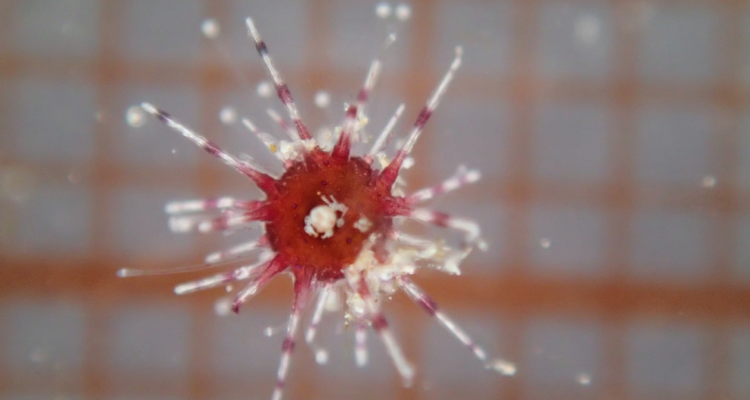
Project
Restoring sea urchins in the Dutch Caribbean
The RAAK PRO Diadema project aims to restore long spined sea urchin (Diadema antillarum) populations on the coral reefs around Saba and St. Eustatius in the Dutch Caribbean. Long spined sea urchins were the most important herbivores on Caribbean coral reefs.
In 1983, more than 95% of the sea urchins died, due to an unknown disease. Without the grazing of the sea urchins, the algae increased in abundance, smothering adult corals and inhibiting the settlement of juvenile corals. As a result, the reef became covered with algae instead of corals. Nowadays, more than 35 years after the die-off, long spined sea urchins are still very rare. They are sometimes abundant in shallow waters, such as harbors, but are seldom seen on the deeper coral reef.
There are strong indications that reduced settlement and high predation pressure on juvenile sea urchins are impairing recovery of the population. Therefore, the aim of this project is to develop interventions that maximize settlement and survival of larvae and juveniles and, by doing this, restore the populations of this important herbivore. During the first phase of the project, research will focus on the biochemical cues that are responsible for settlement and metamorphosis of the larvae. This part of the project will be conducted in the aquarium lab at Van Hall Larenstein in Leeuwarden. In the field, the most important predators will be identified and shelters will be developed that can protect the juveniles. The best working interventions will be combined in an end product, a “Diadema booster”, that can restore the sea urchin populations. This will result in a positive feedback loop: macro-algae will be grazed away by the sea urchins, coral cover will increase and this will result in a more suitable habitat with more shelter opportunities for the sea urchins. If the Diadema project succeeds, the coral reefs around Saba and St. Eustatius, but also on other places in the Caribbean, will become more resilient to other threats.
To do this, University of Applied Sciences Van Hall Larenstein, STENAPA, Saba Conservation Foundation, Wageningen Marine Research, Wageningen University, Caribbean Netherlands Science Institute, University of Applied Sciences HZ, ISER Caribe, Wortel Product Design and Golden Rock Dive Center work together in the RAAK PRO Diadema project. The project is partly funded by the Dutch Organization for Scientific Research (NWO) and will run from 2019 till 2023.
Students
There are multiple BSc or MSc internship or thesis positions within this project. For fieldwork on the islands, you need an Advanced diving certification and at least 30 logged dives. For research focusing on the cultivation of Diadema in Leeuwarden, experience with lab work and/or with the maintenance of aquaria is an advantage.
Atlas episode on the work
Click here for an episode on Atlas about the sea urchin restoration work.